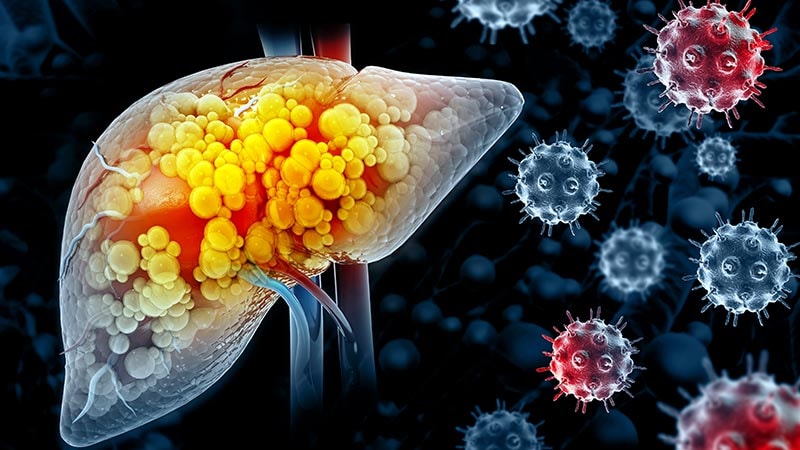
BOSTON — Fewer than one in four patients with liver cancer related to hepatitis C viral infection received all-oral, noninterferon, direct-acting antiviral (DAA) agents, despite the proven survival benefits of these agents in this patient population, results of a retrospective study showed.
And those who did receive DAAs had significantly better 5-year overall survival than those who did not, reported Leslie Yeeman Kam, MD, Stanford University Medical Center, Palo Alto, California, in an oral abstract session here at The Liver Meeting 2023: American Association for the Study of Liver Diseases (AASLD).
Patients with hepatitis C virus (HCV)-related hepatocellular carcinoma (HCC) seen by gastroenterologists and infectious disease specialists, with or without consultation with an oncologist, were more likely to receive antiviral agents than those cared for by general practitioners, she said. Patients with either compensated or decompensated cirrhosis were also more likely to receive DAAs.
Possible reasons for the low uptake of DAAs in this population include a lack of awareness of the availability of the drugs and their potential benefits and/or a lack of resources for testing and treatment, she said.
The findings suggest that “culturally appropriate efforts to improve awareness of HCV must continue among the general public and health care workers, “Kam said.
“Efforts are needed to provide accurate and rapid screening for HCV so that DAA treatment can be initiated in a timely manner for eligible patients.”
Study Details
Kam and colleagues extracted data from Optum’s Clinformatics Data Mart database to identify 3922 adults with HCV-related HCC treated from January 2015 through March 2021. Only 922 (23.5%) of these were treated with DAAs, and 3000 (76.5%) were not.
Patients with prior liver transplant and hepatitis B, D, or HIV coinfection were excluded.
About three-fourths of the patients were male, half were White, and about 82% were treated by either gastroenterologists or infectious disease specialists alone, or gastroenterologists or infectious disease specialists in a team with oncologists.
Slightly more than half of all patients (53.7%) had decompensated cirrhosis.
In multivariate analysis controlling for age, sex, race, type of care provided, and cirrhosis status, factors associated with DAA treatment included younger age, specialty care, and compensated or decompensated cirrhosis compared with no cirrhosis.
The 5-year overall survival rate for patients who received DAAs was 47.2% compared with 35.2% for patients who did not receive them (P < .001).
The investigators acknowledged that the study was limited by the inclusion only of patients with private insurance, meaning that the data cannot be generalized to the uninsured or to patients with government insurance. In addition, there were only limited sustained viral response data, and no cause of death or tumor characteristic information was available.
Fear of the Unknown
The lack of awareness of the benefits of noninterferon DAAs in patients with HCV-related HCC may be due to initial concerns that these agents, which first came onto the market in 2014, might exacerbate HCC, commented Steven Bollipo, MD, director of gastroenterology and endoscopy, John Hunter Hospital, Newcastle, New South Wales, Australia.
“At least for the first two years when DAAs were released, there was a lot of anxiety that DAAs could cause cancer or make cancer worse,” he said in an interview with Medscape Medical News. Bollipo was a comoderator of the session where the data were presented but was not involved in the study.
Although early studies of DAAs from the United States were largely reassuring about the safety of these drugs in patients with HCC, there were conflicting data from European studies that seeded doubt in the minds of many gastroenterologists.
The reasoning behind withholding DAAs in patients with HCC was that, because these patients already had cancer, “the horse has bolted,” Bollipo said.
With more experience, however, clinicians realized that treating patients with HCC and decompensated cirrhosis could improve liver function and perhaps make the patients eligible for additional locoregional therapies, he said.
Comoderator Jennifer C. Price, MD, PhD, associate professor, department of medicine and division of gastroenterology and hepatology, University of California San Francisco, added that another possible explanation for the low uptake of DAA therapy in these patients is that “the timing of treatment in people with HCC is a bit more nuanced.”
“Usually when we diagnose someone with hep C we talk about test and treatment, and we want to treat them right away. But with HCC, we say that it has to take preference initially,” she told Medscape Medical News. But then it’s unclear what’s optimal. Should we “wait until their cancer is in remission and then treat them with [DAAs]. And what do we do if they don’t have a remission?”
The investigators did not disclose a study funding source. Kam, Bollipo, and Price all reported no relevant financial relationships.
Neil Osterweil, an award-winning medical journalist, is a long-standing and frequent contributor to Medscape.
Source: Read Full Article